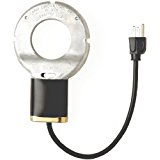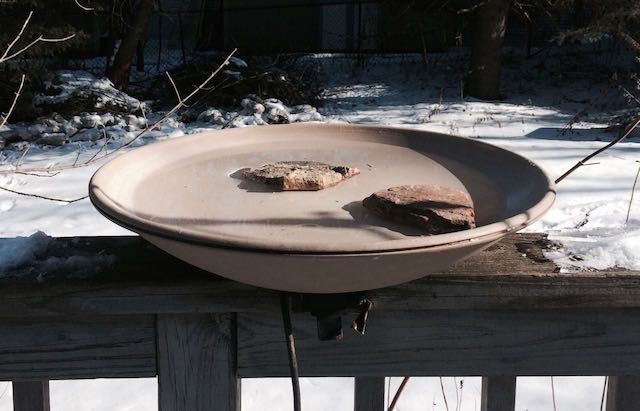
Why Birds Need Fresh Water in Winter
Published by Anne Altor on Jan 6th 2018
Winter bird feeding is about more than providing food!
Although frozen, snow-capped creeks and ponds may be beautiful, cold winters mean extra challenges for birds. Water can be hard to find in suburbia and cities even in warm weather, and birds need fresh water all year long. Yes, birds need to drink too! Although birds can eat snow, it costs them precious energy to warm the snow up to body temperature—a costly expense in severe cold. Flying around in search of water burns more energy and can take birds farther away from food sources. In addition to drinking, birds use water to keep their feathers clean, and some will bathe even in winter.
How to keep your bird bath from freezing!
How do you keep fresh water available in freezing weather? Here are some options:
Use a heated bird bath or pet dish.
Many varieties are available, for a range of prices. A quick search for "heated bird bath" on Google Shopping or Ebay provides a lot of options with reviews. As The Nature Conservancy points out, bathing in winter can be deadly for birds. Consider putting stones or other objects in the bath to provide perches rather than creating an open pool birds might try to bathe in.
Add a heating element to an existing bird bath.
Immersion heaters keep water from freezing. The better models have thermostats that shut them off if the temperature is above freezing. Connect the heater to a GFCI (ground-fault interrupted circuit) to prevent shocks and shorting out. A potential drawback of this method is that the water may freeze outside the zone of the heating element so only part of the bird bath may remain unfrozen. Here are some options for heating elements:

Bird bath de-icer (heating element)
80 W Super Ice Eliminator Birdbath De-Icer (~$30)
Allied Precision Bird Bath De-Icer 250 Watts (~$37)
Use a light bulb and flower pot.
Set up an incandescent light bulb under a clay or metal pot, and set a water dish on top. The heat from the light bulb will keep the water from freezing. This might not work with high-efficiency bulbs, which don't give off much heat.
If you don't have an electrical outlet outside,
you can still provide fresh water. Keep a couple heavy-duty plant trays or other basins in rotation. In the morning, put out fresh water and bring the frozen one in to thaw.
Other tips for providing water to birds in winter:

Heated bird bath with stone perches
Add a few stones or branches to the bird bath to give birds a place to perch without standing in the water.
Avoid concrete bird baths, which can crack when water freezes.
Use a container with a gentle slope that birds can easily wade into.
Do not add glycerine (an antifreeze) to the water. It is toxic at the levels needed to prevent water from freezing and it can stick to feathers and destroy their insulation value.
Keep the bird bath clean. Water filled with bird (or squirrel) poop and other nasties can be toxic to birds and defeat the purpose of providing fresh water.
The simple act of providing fresh water in winter
can make the difference between survival and death for birds in suburbia and cities. With so many natural food and water sources replaced with buildings and pavement, our actions make a difference for creatures whose habitats we've moved into. And if we help birds meet their basic needs, they might have some energy left for fun, like the skiing crow in the video below!
Lifestyle choices that help birds and ecosystems:
Are your everyday routines as eco-friendly as they can be? Want to reduce your plastic use while giving your hair premium care? Try our solid shampoo bars and conditioner bars!
Other important ways you can help birds and ecosystems:
If you have a yard, here are tips for winter maintenance to benefit birds and wildlife. How do leaves benefit your yard and birds? Read all about the benefit of leaves here! Do you have windows that birds fly into? We talk about ways to prevent window strikes in this post. While you're at it, tell your legislators to support bills that will make buildings safer for birds. Thinking ahead to spring, this post describes ways to mow that maximize habitat!
